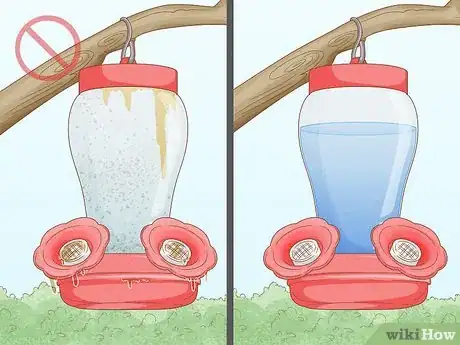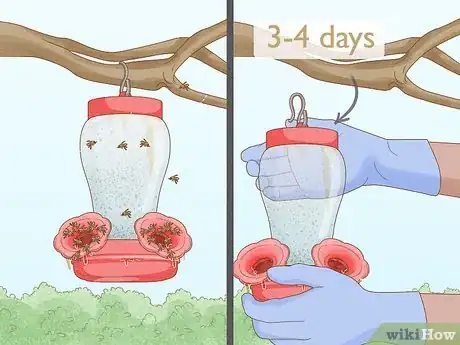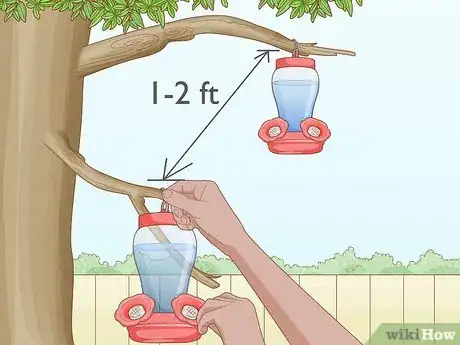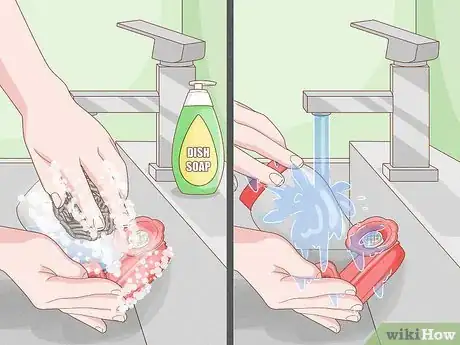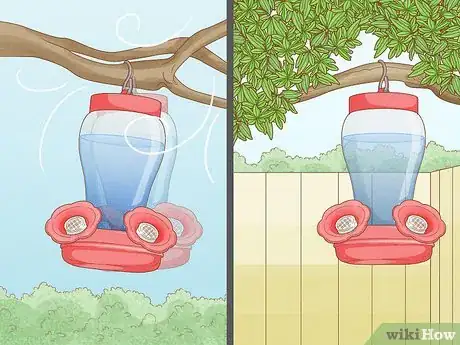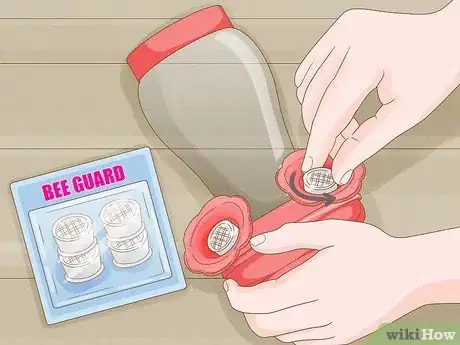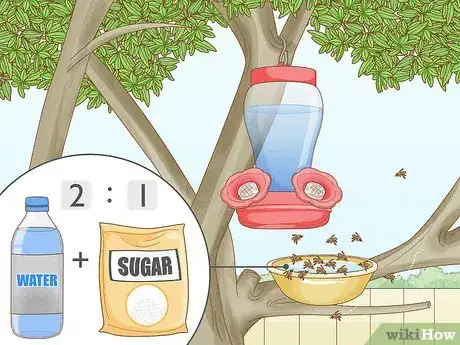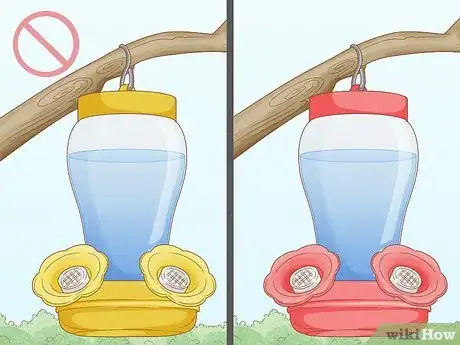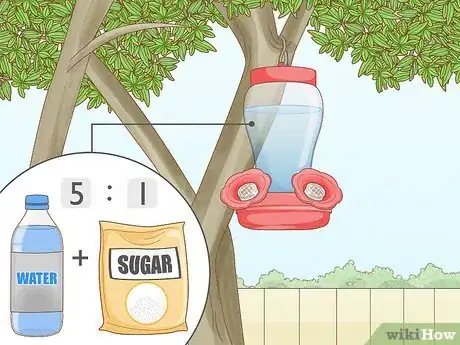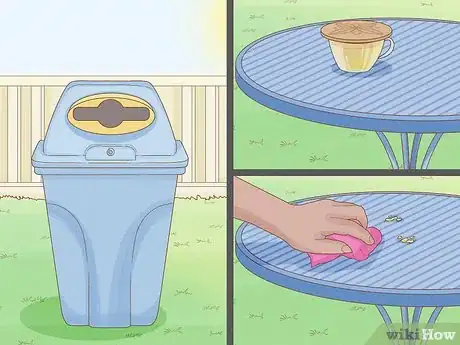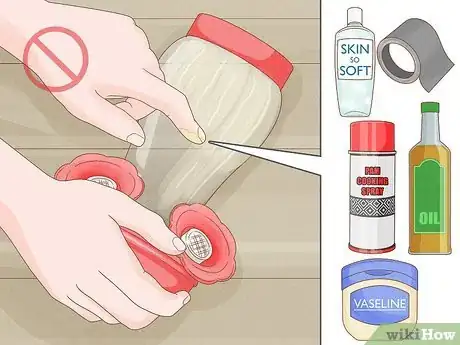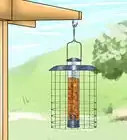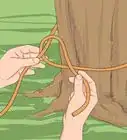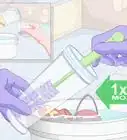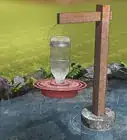This article was co-authored by Steve Downs and by wikiHow staff writer, Hannah Madden. Steve Downs is a Live Honey Bee Removal Specialist, Honey bee Preservationist, and the Owner of Beecasso Live Bee Removal Inc, a licensed bee removal and relocation business based in the Los Angeles, California metro area. Steve has over 20 years of humane bee capturing and bee removal experience for both commercial and residential locations. Working with beekeepers, agriculturalists, and bee hobbyists, Steve sets up bee hives throughout the Los Angeles area and promotes the survival of bees. He has a passion for honeybee preservation and has created his own Beecasso sanctuary where rescued bee hives are relocated and preserved.
This article has been viewed 17,130 times.
Hummingbird feeders are great at attracting hummingbirds, but they also attract insects like bees. While bees are great pollinators to have in your yard, they aren’t great feeding companions, as they often fight hummingbirds for spots at the feeders.
In this article, we've detailed how you can get rid of the bees near your feeder and stop them from coming back.
Steps
Tighten all the feeder parts so they don’t leak.
-
If your feeder leaks, bees will flock to it. Experts note that the best way to keep bees away is to make sure your feeder stays tidy, so take a second to tighten all the feeding ports and the dish at the bottom. If anything is leaky, repair the feeder.[1] X Trustworthy Source National Audubon Society Nonprofit environmental organization focused on conservation, citizen science, and public science education Go to source
Empty your feeders for 3 to 4 days.
-
You can confuse bees by removing the feeder for a few days. If you notice bees flocking to your hummingbird feeder, take it down and empty it out. Keep it down for at least 3 days, then put it back up when the bees have relocated to a new spot. Hopefully, the bees will find somewhere else to feed during this time, so your hummingbirds can come feed in peace.[2] X Research source
- This method works best when there are lots of flowering plants for the bees to go get nectar from. However, if the flowering plants are all dying back for the winter, they may find your feeder again.
Relocate the feeder to confuse the bees.
-
Sometimes, simply moving it a few feet away is enough to deter them. If the bees have found your hummingbird feeder, take it down and move it 1 to 2 ft (0.30 to 0.61 m) away. Insects usually only visit convenient sources of food, so they won’t spend a ton of time looking for the feeder after they realize it’s gone.[3] X Research source
- Don’t worry—moving your hummingbird feeder won’t confuse the hummingbirds, especially if it’s not far away from its original spot.
Clean the feeders with soap and water.
-
Try to do this once a week to avoid attracting bees. Wet a sponge and lather up some dish soap, then gently sponge the feeding ports and the small dish. Rinse the feeder with lots of clean water, then fill it back up and hang it again.[4] X Research source
- Leaky hummingbird feeders attract bees more than anything else, because it’s easy to sip the sweet sugar water off the side of the feeder.
Hang your feeders in non-windy areas.
-
A feeder whipping in the wind can cause it to leak. These leaks can attract bees, so it’s best to stop them before they happen. If you notice that your feeder is moving and shaking in the wind, relocate it to a covered area so it won’t move around as much.[5] X Trustworthy Source National Audubon Society Nonprofit environmental organization focused on conservation, citizen science, and public science education Go to source
- Consider putting your feeder under a covered area, like your patio.
Attach a bee guard to the feeder.
-
The hummingbirds will be able to get through, but not the bees. Bee guards look like small, circular grates that fit onto the feeding ports of the feeder. Snap these grates onto each of the ports to discourage bees while still letting your favorite birds have a sip.[6] X Research source
- You can find bee guards at most garden supply stores.
- If you deal with ants in your hummingbird feeder, consider buying an ant moat, too.
Give the bees their own feeder.
-
Make up a shallow bowl filled with sugar water so the bees go somewhere else.[7] X Expert Source

Live Bee Removal Specialist Expert Interview. 23 February 2020. Bees like a stronger, sweeter solution than hummingbirds, so make up a 2:1 ratio solution of water to sugar. Place the solution in a shallow dish, then set it near the hummingbird feeder. When the bees notice the “better” feeding option, they’ll flock to the bowl and not the feeder.[8] X Research source- To move the bees further away from the feeder, set your shallow dish near the feeder and move it away incrementally day by day. Eventually, you can have your bee feeder across the yard from your hummingbird feeder.
Use a red feeder, not a yellow one.
-
Insects are attracted to the color yellow. If your hummingbird feeder is yellow, consider painting it red with non-toxic paint. Hummingbirds love the color red, but bees couldn’t care less about it. If you have any yellow accents on your feeder, you can paint them red using a non-toxic paint.[9] X Research source
- You should also try to avoid adding any yellow accessories to your hummingbird feeder, like bee or ant traps.
Dilute the mixture in your feeder.
-
Use a 5:1 ratio of water to sugar instead of a 2:1 ratio. The hummingbirds won’t like this solution quite as much, but the bees will like it even less. Bees prefer more sugar in their water, so they might just leave to find another source. Once the bees are gone, you can switch back to your old hummingbird solution.[10] X Research source
- The ideal mixture for hummingbirds is 4 parts water mixed with 1 part sugar, with no added red dye.
- If you’re using premixed hummingbird solution, try diluting it with water.
Keep your yard clean.
-
Bees are attracted to food and drinks. The more yummy things you have in your yard, the more likely bees will flock to it. Be sure to cover your garbage cans with tight lids, and take old food inside to throw it away.[11] X Expert Source

Live Bee Removal Specialist Expert Interview. 23 February 2020. Cover up your soda and tea if you’re outside, since bees are attracted to sugar water.[12] X Research source- Cleaning up food right away is a great way to deter most pests, not just bees.
Avoid putting oils or creams on your hummingbird feeder.
-
Products like these can harm the hummingbirds. You might see some sites that recommend adding oils, Vicks Vapor Rub, Pam Cooking Spray, Duct Tape, Off, Skin-so-soft, or Vaseline to your hummingbird feeder. While these will deter bees slightly, the products can also get stuck in hummingbirds’ wings, making it hard for them to take off. In general, keep your hummingbird feeder clean to avoid harming the birds that feed from it.[13] X Research source
- Hummingbirds tend to bump into their feeders often, which is why products tend to rub off on their feathers.
You Might Also Like
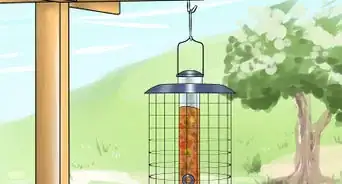
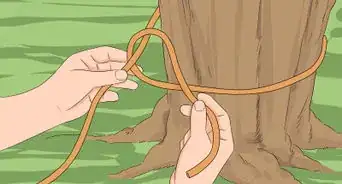
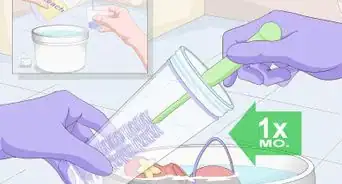
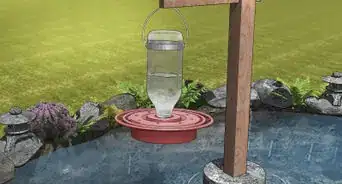

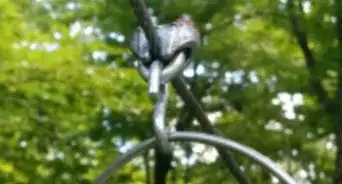
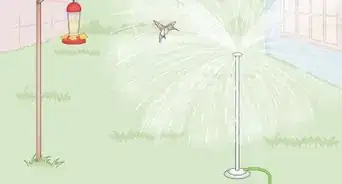
References
- ↑ https://www.audubon.org/news/how-keep-your-hummingbird-feeder-free-pests
- ↑ https://extension.oregonstate.edu/ask-expert/featured/how-can-i-keep-bees-away-my-hummingbird-feeder
- ↑ https://journeynorth.org/tm/humm/bees_at_feeder.html
- ↑ https://journeynorth.org/tm/humm/bees_at_feeder.html
- ↑ https://www.audubon.org/news/how-keep-your-hummingbird-feeder-free-pests
- ↑ https://www.worldofhummingbirds.com/uninvitedbees.php
- ↑ Steve Downs. Live Bee Removal Specialist. Expert Interview. 23 February 2020.
- ↑ https://journeynorth.org/tm/humm/bees_at_feeder.html
- ↑ https://journeynorth.org/tm/humm/bees_at_feeder.html
- ↑ https://www.worldofhummingbirds.com/uninvitedbees.php
- ↑ Steve Downs. Live Bee Removal Specialist. Expert Interview. 23 February 2020.
- ↑ https://journeynorth.org/tm/humm/bees_at_feeder.html
- ↑ https://www.worldofhummingbirds.com/uninvitedbees.php
About This Article

